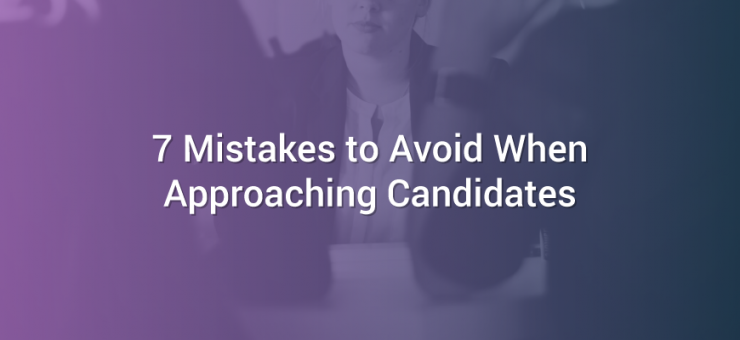With the rise in popularity of LinkedIn, recruiters are spending more of their time looking for potential candidates on the professional social media site. And it’s for good reason, with 3.4 million accounts using the site’s Open Candidate feature, lets recruiters know they might be open to a new opportunity.
But many recruiters still miss the mark when they make first contact with a potential candidate via InMail. Here are some of the mistakes that are being made, both on LinkedIn and in other forms of cold approach, for you to avoid.
1. Getting Their Name Wrong
Web manager Paul Kim vented about some approaches he’d had from recruiters who were hoping he’d be right for their clients. Not only had he been addressed as ‘Kim,’ which showed a lack of attention, but he’d also received emails address to, ‘Dear <First Name> <Last Name>’.
While these mistakes are understandable, they’re just oversights, they do leave the candidate with the impression that you’re not really paying attention to your outreach. How likely are you to reply to someone like that?
2. Not Reading Their Profile
Imagine getting an email or InMail from a recruiter, saying they have a role they think you’re perfect for…but when you look, it’s not remotely in your field. Just because a candidate appears in a keyword search doesn’t mean you should make contact; take a few minutes to check their career history and see if they really are a match.
It will avoid you contacting administrators who have worked in FinTech for a trader’s role, or for trying to recruit someone to the company they already work for. Yes, that has actually happened.
3. Not Understanding the Vacancy
This should be recruitment 101, but if you’re trying to fill a role make sure that you really understand it. Take some time to look through the job description and talk with the hiring manager to see which skills are necessary and which are just ‘nice to have’.
4. Calling During Work Hours
It’s pretty awkward to take a call from a recruiter when a candidate is sitting at their desk, being paid by their current employer. If you call without warning, you might catch your candidate with their manager at their desk, or send the office gossip talking. In these days of smartphones, you don’t even need to get through to cause a problem; if your candidate has stored your number in their phone and you’re known in the industry even a missed call can be an issue.
Instead, try sending an email or text message and ask the person to call you when it’s convenient. That gives them the time to make an excuse and pop out to where they can speak freely. Even if you do get through in the office, they’re unlikely to be able to talk freely so this approach will help communication immensely.
5. Talking About Yourself
The polite thing to do in conversation is to introduce yourself, and while the same holds true for an InMail, remember that you are taking up a candidate’s time with an approach they might not be interested in. They know your name from the message and can read about your work experience if they’re interested. Get right into what you have to offer them, and you’ll stand a better chance of engagement.
6. Not Showing Them the Money
Or rather, show them the benefits of the role. What does it offer that makes it an outstanding opportunity? Career advancement, training, bonuses – these are the things that will engage a candidate’s interest.
That includes talking about salary. Don’t waste anyone’s time on an opportunity that might be well below what they’re looking for. It’s OK to give a range but make it a reasonable one. Telling someone they could get between 20 and 40 thousand a year is really no help at all.
In extreme situations, this can cost everyone involved. Take the case of Grace Morgan who was headhunted into a new role, only to find the offer was 10k below her current salary! The employer thought she’d upped her ask, Grace thought they were trying to lower theirs and everyone ended up furious with the recruiter. Don’t be that person!
7. Don’t Tout Before You Have the Candidate
An opportunity comes in, and you know just the person to fill it. You settled them into a senior role a while back, and you figure they’re probably looking for another challenge just now. So, what’s the harm in sending out their CV?
Hopefully, the answer to that question is obvious – if your Rockstar applicant isn’t interested and you’ve dangled them in front of the client, you could disappoint and look unprofessional. And if you’re sending out the CV of someone already in a role, you could risk getting them into hot water at work. If they let their HR department know that you’re trying to poach from staff you placed with them, you could lose a valuable contract.
It’s All About Connection
According to LinkedIn’s own statistics, candidates are 95% more likely to accept an InMail message from you if they follow your company already. The only way you can cultivate a following of engaged candidates is to create valuable content including posting your job openings.
There’s no doubt that approaching candidates via LinkedIn is a great way to reach new people. While it might make head hunting a lot easier, don’t let it make you lazy. If you put in the required effort you should see your response rates booming!
About the Author
 Sarah Dixon is a freelance writer and author who lives in York. She dreamed of being a writer as a child, but managed to do almost everything else before settling on it as a career. She particularly enjoys writing about how human beings interact with technology, both in fact and fiction. She writes for graduate recruitment agency, Inspiring Interns & Graduates.
Sarah Dixon is a freelance writer and author who lives in York. She dreamed of being a writer as a child, but managed to do almost everything else before settling on it as a career. She particularly enjoys writing about how human beings interact with technology, both in fact and fiction. She writes for graduate recruitment agency, Inspiring Interns & Graduates.











